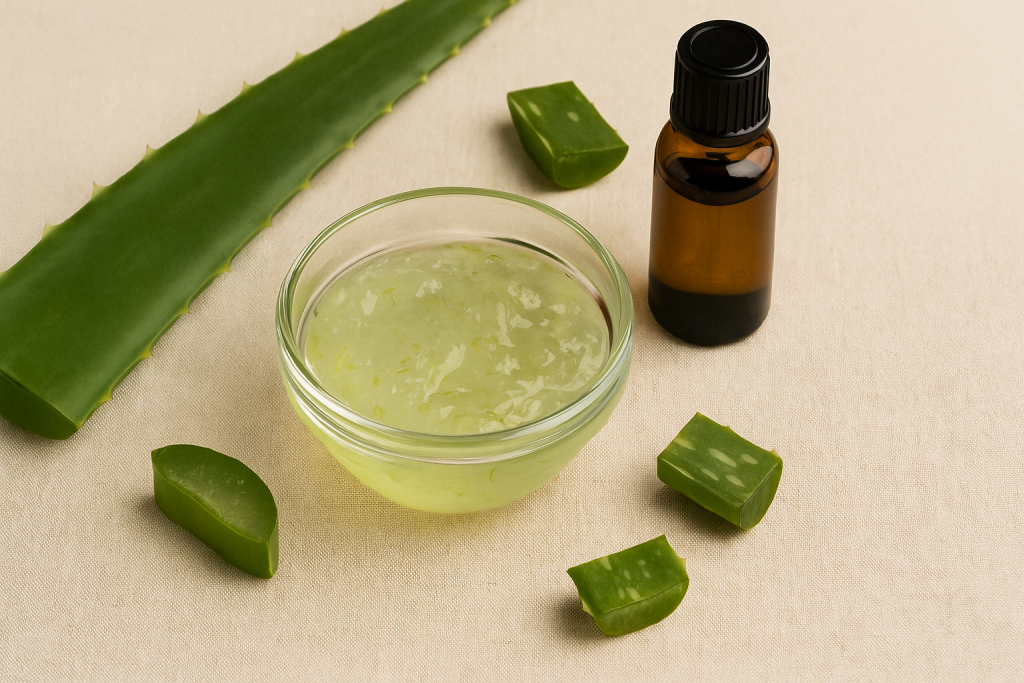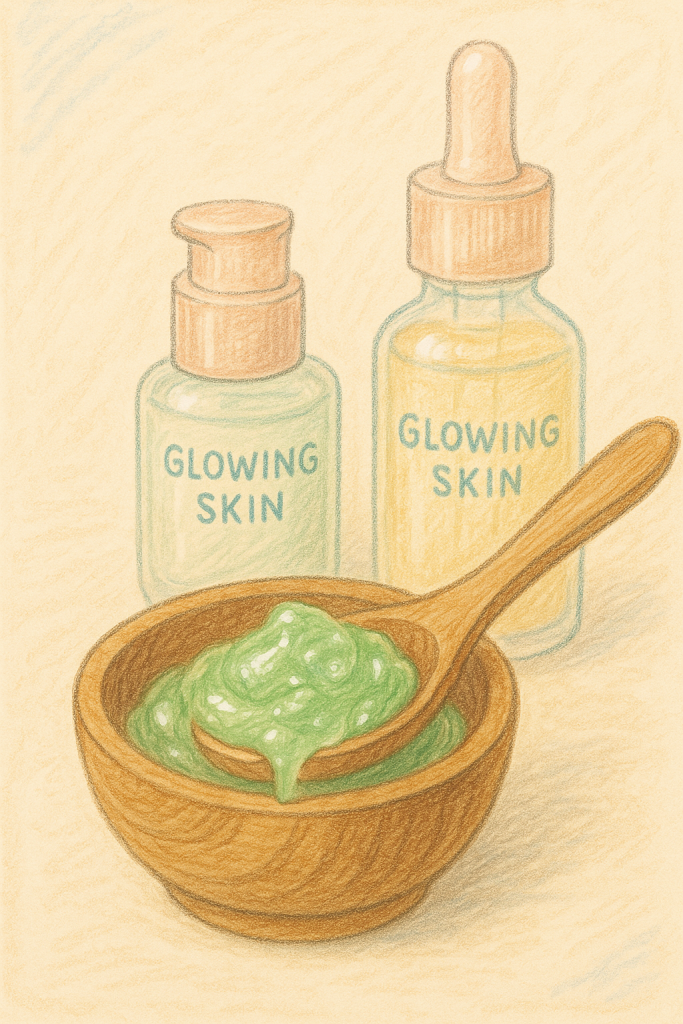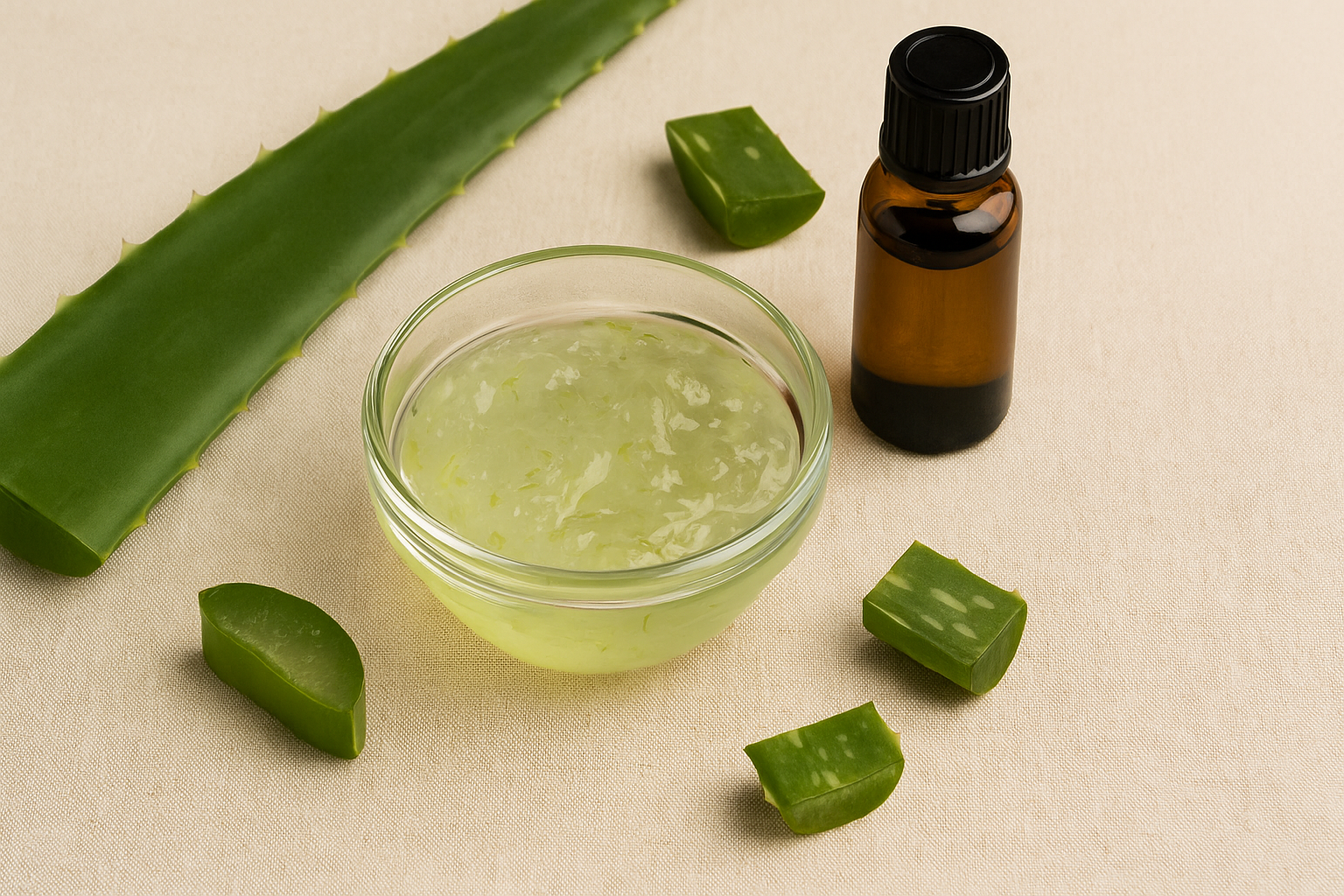
Not Just for Sunburns, Love
There it is—sitting nobly by your kitchen window, spiky, green, and slightly smug. If your aloe vera plant could talk, it might say, “You think I’m just for sunburn? Sit down, love—we need to chat.”
Aloe vera, the fleshy plant found in everything from after-sun lotions to face masks, is so much more than a skincare saviour. Known as the “plant of immortality” in ancient Egypt¹, this powerhouse is now winning hearts in UK homes for its whole-body healing powers.
With summer staycations on the rise and sun-kissed mishaps as common as tea spills, more Brits are keeping an aloe pot handy. But what if I told you it could do wonders inside your body too?
Let’s pull back the curtain on this juicy little wonder—from digestion to immunity, skin to scalp, and even blood sugar. It’s time to discover how aloe vera can quietly transform your health from the inside out.
What Exactly Is Aloe Vera?
Aloe vera is a succulent plant with thick, water-storing leaves filled with a cooling, clear gel. That gooey gel is made up of over 75 active compounds including vitamins, minerals, enzymes, amino acids, and antioxidants².
There are two main parts of the plant used:
- Aloe gel: the clear jelly inside the leaf—cooling and hydrating.
- Aloe latex: the yellow sap found just under the skin—used more cautiously due to its powerful laxative effect.
✅ Tip: When using fresh aloe at home, scoop out the clear gel only, avoiding the yellowish sap unless advised by a healthcare provider.
1. Aloe Vera for Gut Health & Digestion
“Did you know… Aloe vera can soothe your tummy like a cup of peppermint tea on a rainy day?”
Aloe vera juice is gaining popularity as a natural remedy for:
- Indigestion & bloating
- Acid reflux (GERD)
- Irritable bowel syndrome (IBS)
- Constipation relief³
Its anti-inflammatory and enzymatic properties calm irritated gut lining and help break down sugars and fats⁴. Think of it as a natural internal balm.
Myth Buster 🧪
Myth: Aloe vera is only for external use.
Truth: Drinking small amounts of aloe gel (not latex) is safe and even beneficial for digestive support.
💡 Use Tip: Sip on diluted aloe vera juice before meals (about 10–30 ml) to support digestion. Always opt for food-grade, decolourised juice.
2. Skin Deep: Beauty Benefits from the Inside Out
From Cleopatra to Kendall, glowing skin never goes out of style. But true skin radiance often starts in the gut and liver—two areas where aloe quietly shines.
Thanks to its hydrating, detoxifying, and anti-inflammatory actions, aloe vera can help:

- Reduce acne breakouts⁵
- Soothe eczema and psoriasis
- Promote collagen production for firmer skin⁶
- Heal minor cuts, burns, and irritation
🌱 Fun Fact: Aloe contains aloin, which may protect the skin from UV damage and delay signs of ageing⁷.
Quidian Tip: At Quidian Naturals, our aloe-based DIY skin balm is made from organically sourced plants and features in our free ‘Glow Naturally’ download. Check it out on our Recipes page!
3. Aloe Vera for Blood Sugar & Metabolic Support
If you’re looking to keep your energy stable throughout the day (without relying on biccies and caffeine), aloe may lend a hand.
Some early studies suggest that aloe vera gel may help reduce fasting blood sugar levels in people with type 2 diabetes⁸. This may be due to its ability to:
- Improve insulin sensitivity
- Reduce inflammation
- Enhance glucose metabolism
BIG FACT:
A 2016 meta-analysis showed that aloe vera significantly reduced fasting blood glucose and HbA1c in type 2 diabetics⁹.
Of course, aloe isn’t a magic bullet. Always talk to your GP before using it alongside medications, especially if you’re managing diabetes.
🍵 Tip: Add a splash of aloe vera juice to your morning herbal tea to kickstart your metabolism gently.
4. Immunity Boost and Detoxification
If winter sniffles hit your house faster than a kettle boils, your immune system may need a boost.
Aloe vera is rich in antioxidants, especially vitamins A, C, and E, plus trace elements like zinc and selenium—key players in immune defence¹⁰.
Its anti-microbial properties also help fight off pathogens in the gut and skin, the body’s first lines of defence.
✅ Bonus: Aloe may support gentle liver detoxification, helping the body process waste and pollutants (yes, including that cheeky takeaway you promised was your last).
5. Soothing the Scalp and Strengthening Hair
Scalp itchier than your cousin’s new crochet jumper? Aloe vera could be the game-changer.
Applied topically or consumed internally, aloe can:
- Reduce dandruff thanks to its anti-fungal effects¹¹
- Soothe scalp inflammation
- Balance oil production
- Strengthen hair follicles
💁♀️ Aloe vera’s natural enzymes gently exfoliate the scalp, making room for new growth and less flaking.
At Quidian Naturals, we often remind our readers: healthy hair starts with a happy scalp AND a healthy gut. Aloe has you covered on both.
6. Aloe Vera for Oral and Dental Health
This might surprise you: aloe’s antibacterial and antifungal powers extend into your mouth!
It’s been shown to reduce:
- Plaque formation
- Gingivitis (gum inflammation)
- Mouth ulcers or canker sores¹²
Aloe-based toothpaste or rinses are now popular alternatives for those avoiding harsh chemicals like SLS or fluoride.
🦷 Try swishing a small amount of aloe vera juice (diluted) as a gentle mouth rinse!
Is Aloe Safe? What to Know Before You Slurp
While aloe gel is generally safe in small, food-grade doses, the latex (yellow sap) can cause:
- Cramping
- Diarrhoea
- Electrolyte imbalance
⚠️ Pregnant and breastfeeding women, children under 12, and those on medication should consult a healthcare professional before consuming aloe internally.
Storage Tip: Fresh gel keeps 5–7 days in the fridge. For longer use, freeze into ice cubes!
How to Choose Quality Aloe Vera Products
Because aloe is everywhere, from £1 gels to luxury juices, how do you choose what actually works?
Here’s what to look for:
- Inner leaf gel only (decolourised)
- Organic or pesticide-free
- No added sweeteners or thickeners
- Short ingredients list
🛒 At Quidian Naturals, we only recommend aloe from sources that use cold-pressed, whole-leaf extraction without additives.
Recap: Aloe Vera’s Top Benefits at a Glance
| Benefit | How It Helps |
|---|---|
| Digestion | Soothes inflammation, aids IBS |
| Skin Health | Hydrates, heals acne and burns |
| Blood Sugar | May lower fasting glucose |
| Immunity | Rich in antioxidants, detox support |
| Oral Health | Fights plaque, soothes ulcers |
| Scalp & Hair | Calms itch, supports follicle health |
Aloe vera is more than a spiky plant by your sink—it’s a humble, healing powerhouse that supports everything from digestion to radiance, immunity to oral care. And the best part? You don’t need to spend a fortune or search far and wide. It’s already growing right under your nose.
🌿 Ready to try aloe the Quidian way?
Visit our Recipes Page for aloe-powered DIYs—from calming teas to nourishing skin masks.
References
- Al-Daihan, S. Aloe vera: The Miracle Plant. Journal of Pharmacognosy and Phytochemistry. PDF
- Eshun, K., & He, Q. (2004). Aloe vera: A valuable ingredient for the food, pharmaceutical and cosmetic industries—a review. Critical Reviews in Food Science and Nutrition. https://doi.org/10.1080/10408690490424694
- Langmead, L., et al. (2004). Randomized, double-blind, placebo-controlled trial of oral aloe vera gel for active ulcerative colitis. Alimentary Pharmacology & Therapeutics. https://doi.org/10.1111/j.1365-2036.2004.02023.x
- Pandey, R., & Mishra, A. (2010). Antibacterial activities of crude extract of Aloe barbadensis to clinically isolated bacterial pathogens. Applied Biochemistry and Biotechnology. https://doi.org/10.1007/s12010-010-8904-3
- Vogler, B. K., & Ernst, E. (1999). Aloe vera: A systematic review of its clinical effectiveness. British Journal of General Practice. PubMed Central
- Dal’Belo, S. E., Gaspar, L. R., & Maia Campos, P. M. (2006). Moisturizing effect of cosmetic formulations containing Aloe vera extract in different concentrations. Skin Research and Technology. https://doi.org/10.1111/j.0909-725X.2006.00172.x
- Surjushe, A., Vasani, R., & Saple, D. G. (2008). Aloe vera: A short review. Indian Journal of Dermatology. PubMed Central
- Huseini, H. F., et al. (2012). The clinical effectiveness of Aloe vera gel on insulin resistance in prediabetic patients: A randomized controlled trial. Journal of Complementary and Integrative Medicine. https://doi.org/10.1515/1553-3840.1513
- Yongchaiyudha, S., et al. (1996). Antidiabetic activity of Aloe vera L. juice. Phytomedicine. https://doi.org/10.1016/S0944-7113(96)80064-6
- Boudreau, M. D., & Beland, F. A. (2006). An evaluation of the biological and toxicological properties of Aloe barbadensis (Miller), Aloe vera. Journal of Environmental Science and Health. https://doi.org/10.1080/10937400600645956
- Malekzadeh, F. (2008). Antibacterial activity of Aloe vera against clinical isolates of Staphylococcus aureus. Iranian Journal of Pharmaceutical Research.
- Choonhakarn, C., et al. (2008). The efficacy of aloe vera gel in the treatment of oral lichen planus: A randomized controlled trial. British Journal of Dermatology. https://doi.org/10.1111/j.1365-2133.2008.08440.x
